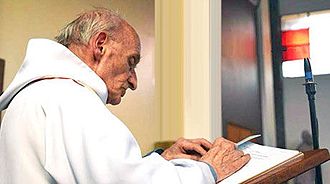
Father Jacques Hamel
The murder of French priest Jacques Hamel has laid bare a culture war between Catholic traditionalism and contemporary multiculturalism, or so claims Ross Douthat in his latest New York Times column. For the multiculturalists — including progressive Catholics up to and including Pope Francis — the murder “belongs not to the old iconography of a church militant under siege by unbelievers, but to the modern vision of a multicultural, multireligious society threatened primarily by ignorance and fear.”
To be fair, Douthat allows as how the two world-views need not be mutually exclusive. Which is to say that designating Father Hamel a martyr need not exclude “rejecting sweeping narratives about Islamic violence or religious war.” Likewise: “An old-fashioned Catholic martyrdom may be possible in a multicultural, late-modern society. But there is still a sense in which it is not supposed to happen here.”
Something is wrong with this picture. Catholic martyrdom in its classic sense is not about “a church militant under siege by unbelievers” but about the persecution of dissenters from the multicultural, multireligious social order of the Roman Empire. That order required everyone (except the Jews, who were grandfathered out, so to speak) to accord divine honors to the Emperor.
Early Christians were thrown to the lions because they refused to engage in such civil religious ceremonial. But like the Jehovah’s Witnesses, whom the Supreme Court excused from having to say the Pledge of Allegiance in 1943, they eventually won the toleration they were seeking. In 313, the Roman Emperors Licinius and Constantine issued what’s known as the Edict of Milan, which stated:
When you see that this has been granted to [Christians] by us, your Worship will know that we have also conceded to other religions the right of open and free observance of their worship for the sake of the peace of our times, that each one may have the free opportunity to worship as he pleases; this regulation is made that we may not seem to detract from any dignity of any religion.
Of course, by the end of that century the Christians were in control and not so interested in maintaining the Edict’s regime of universal religious tolerance. With the exception of the Jews (who were grandfathered in, up to a point), all religions other than Christianity were banned. By the Middle Ages, the church militant was making martyrs of others — pagans, Cathars, Waldensians, Muslims, and (now and again) Jews.
Our own era does not hesitate to identify martyrs, and not only secular ones like gay rights witness Matthew Shepard. There’s also that old-fashioned Catholic witness Oscar Romero, whom Pope Francis officially declared a martyr last year, in a step toward making the murdered Salvadoran archbishop a saint.
Should Father Hamel receive the same honor? In Europe this summer, no one doubts that he was murdered because he was celebrating Mass, by Muslim individuals acting according to their jihadist religious lights. But the Church has always been cautious about designating martyrs, particularly in real time, when it may expose others to danger.
And so one must ask: Does it help or hurt Christians at risk in the Middle East and elsewhere for Father Hamel to be celebrated as the latest martyr to the faith?





